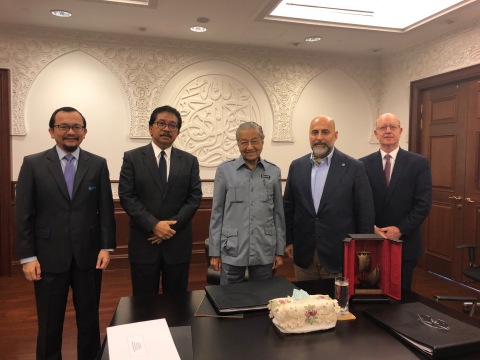KUALA LUMPUR, Malaysia--(BUSINESS WIRE)--Malaysia’s Prime Minister Dr. Tun Mahathir Mohammad convened a briefing session with the Malaysian Technology Development Corporation (“MTDC”) and the Global Coalition for Efficient Logistics (“GCEL”) to discuss how the Digital Economy Platform (DEP) can assist to achieve Malaysia’s Shared Prosperity Vision 2030 objectives.
MTDC is a wholly-owned subsidiary of Khazanah Nasional, Malaysia’s sovereign wealth fund, and has been the key player in commercialization and management of government funding since the 7th Malaysia Plan. MTDC was represented by Chairman Tan Sri Abdul Rahman Mamat, Secretary General of Malaysia’s Ministry of International Trade and Industry (2006-2010) and Chief Executive Officer Dato’ Norhalim Yunus. GCEL was represented by Chairman Captain Samuel Salloum and Deputy Secretary General Gregory Bird.
Malaysia’s Shared Prosperity Vision 2030 includes 15 Key Economic Growth Activities (KEGA) towards increasing the incomes of the economically poor within the Malaysian society.
GCEL has developed the Malaysia Digitization Program centered upon a DEP that supports 7 of 15 KEGAs mandated to translate Malaysia’s vision into measurable delivery. The DEP delivers thousands of free Apps across its e-commerce, e-finance, e-insurance and e-logistics dimensions that will digitize the global B2B value chains.
Captain Salloum exclaimed, “the DEP will be deployed by the world’s top technology companies, as well as national e-commerce, finance and insurance firms that generate USD 1.5 trillion in revenues with 4.7 million manpower. These organizations will digitize the USD 150 trillion B2B marketplace, unleashing USD 20.5 trillion in new digital services by 2030.”
Tan Sri Abdul Rahman noted, “GCEL has conducted 15 years of R&D on the Digital Economy and executed strategic agreements with pan regional organizations representing 150 member countries, 26 IGOs/NGOs and the world’s top technology firms.” He added, “this initiative is unprecedented since its governance structure is geopolitically balanced and non-monopolistic to safeguard each nation’s sovereignty and privacy of its trade and trade data.”
GCEL previously conducted the Malaysia Shipment Efficiency Assessment (SEA) with the Malaysia Digital Economy Corporation (MDEC) to diagnose trade efficiency and identify the digital tools required to increase trade and create jobs. Malaysia’s SEA was followed by the G20 Nations Case Study of trade efficiency conducted by 90 G20 ministries, IGOs/NGOs and private sector experts representing nearly 80% of the global GDP. The Case Study collected 1.2 million data points through face to face interviews across 19 industry clusters covering all economic zones.
The Case Study revealed 90.4% of Malaysia’s trade partners do not have an integrated system and 94.5% have commonly defined and want the DEP to do a better job at the ground level.
GCEL has also executed national agreements with the Organization of Islamic Cooperation, League of Arab States, Organization of American States and the African Union to promote adoption of the DEP in their regions.
During the session GCEL introduced the Asia Benchmark Trade Lane Program and the 6 steps to digitize businesses creating a conducive ecosystem that increases efficiency to facilitate economic growth. The Program is projected to reduce Malaysia’s trade costs by USD 55 billion, increase trade by USD 122 billion and generate nearly 9.5 million manufacturing, agriculture and service industry jobs by 2030.
H.E. Tun Mahathir concluded, “This initiative can speed up and contribute to the rapid growth of the Malaysian economy. Having access to 'Big Data' by all will assist trade participants to know more about each other to increase trade.”




